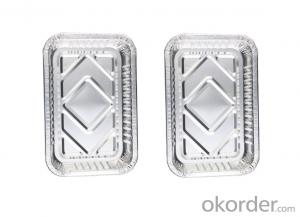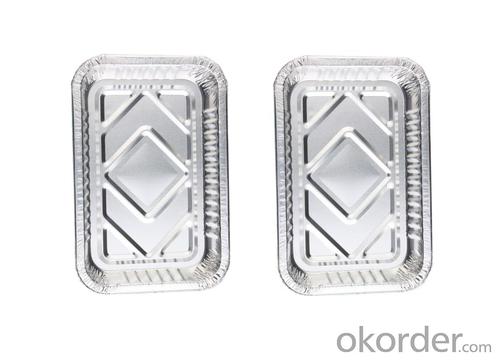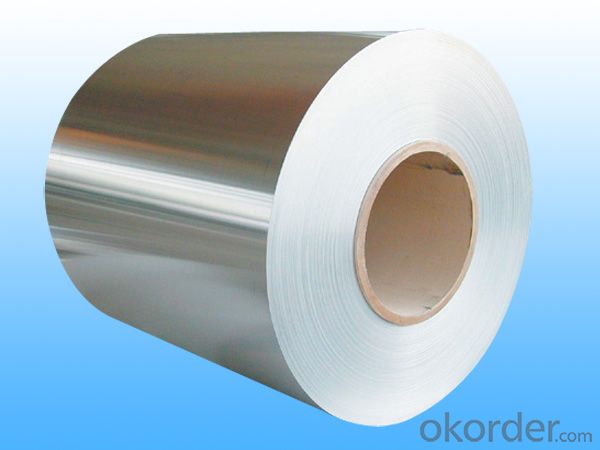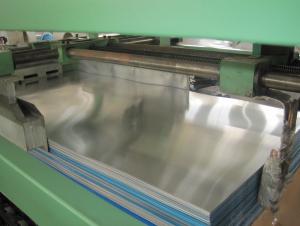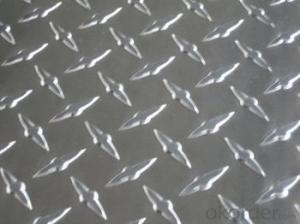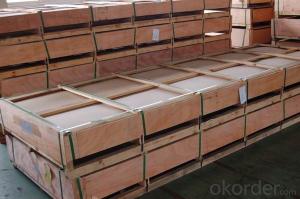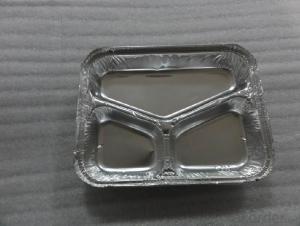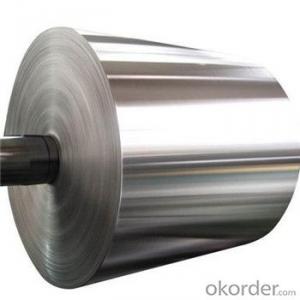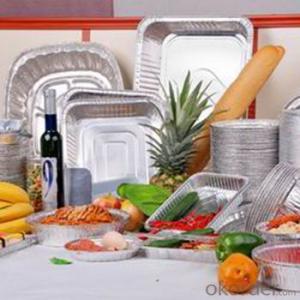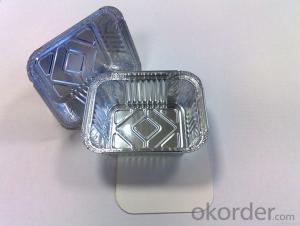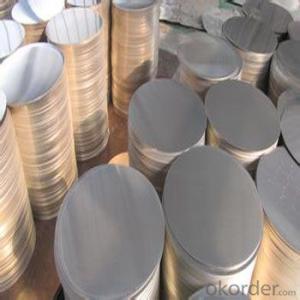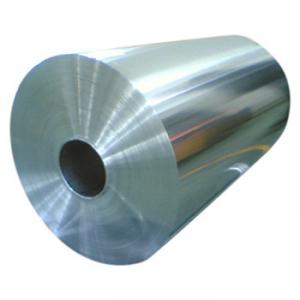Wholesale 1100 Aluminum Sheets for Food Packaging Aluminium Foil Containers
- Loading Port:
- Shanghai
- Payment Terms:
- TT OR LC
- Min Order Qty:
- 5 m.t
- Supply Capability:
- 5000 m.t/month
OKorder Service Pledge
Quality Product, Order Online Tracking, Timely Delivery
OKorder Financial Service
Credit Rating, Credit Services, Credit Purchasing
You Might Also Like
Aluminum foil, an eco-friendly & non-toxic material. The most effective use of the aluminium foil is as a packing material. Mainly used for household purpose, such as storing, packaging, roasting, freezing, heating in food factory, hotel, restaurant, airline etc.
Specifications:
Top Out:160x110mm
In Out:145x95mm
Bottom:125x75mm
Height:35mm
Applications:
Banquet,Cuisine,Roasting,Freezing,Baking,Storage,BBQ.
Advantages:
Environmental protection,recyclable,convenient,safe,healthy,no peculiar smell
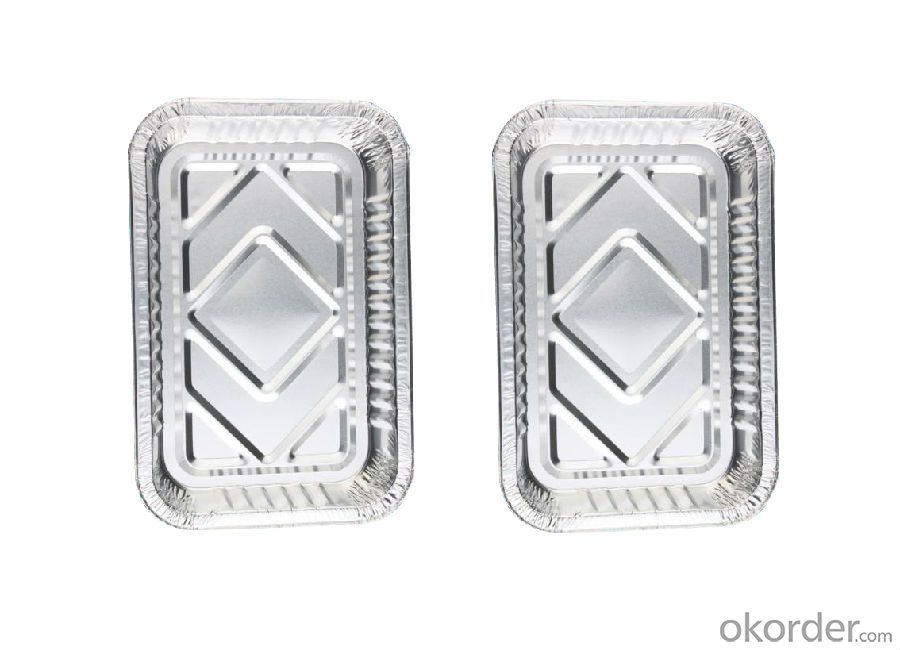
- Q: I've created a sculpture out of aluminum foil, but it's pretty flimsy. What can I paint or cover it with that would harden and support it? I was thinking a resin or something, but I have no experience with resins or epoxies... Any suggestions?
- You have to make it thick, the aluminum IS weak material. or use harder raw material.
- Q: How does the surface cleanliness of aluminum sheet affect its adhesion properties?
- The surface cleanliness of aluminum sheet has a significant impact on its adhesion properties. A clean surface is crucial for achieving strong adhesion because any contaminants, such as dirt, oil, or oxidation, can inhibit the bonding process. These impurities create a barrier between the adhesive and the aluminum surface, reducing the strength of the bond. Therefore, ensuring the surface is properly cleaned and free from any contaminants is essential to maximize the adhesion properties of aluminum sheet.
- Q: Are the aluminum sheets available in different finishes (e.g., brushed, polished)?
- Aluminum sheets can be obtained in various finishes, such as brushed or polished, providing different surface textures and appearances. These finishes are achieved by employing diverse processes that modify the aluminum sheets. Brushed finishes, for instance, create a textured pattern by delicately brushing the surface with fine abrasive materials, resulting in a satin-like look. Conversely, polished finishes involve utilizing abrasive compounds or polishing wheels to buff the surface to a high shine. Consequently, these distinct finishes enable the customization and versatile utilization of aluminum sheets across different industries.
- Q: How does the thickness tolerance of aluminum sheet affect its usability?
- The usability of aluminum sheet is greatly influenced by its thickness tolerance, which refers to the acceptable deviation from the specified thickness. This tolerance is typically expressed as a range or a plus/minus value. Having a tighter thickness tolerance guarantees that the aluminum sheet consistently meets the desired specifications. This is crucial in industries such as aerospace, automotive, and construction, where precise dimensions are necessary. Even a slight deviation in thickness can have a negative impact on the performance and functionality of the product. For example, in aircraft manufacturing, the thickness tolerance of aluminum sheets used for structural components is of utmost importance. A thin sheet could compromise the structural integrity, while a thicker sheet could add excess weight, affecting fuel efficiency. Similarly, in the automotive industry, precise thickness tolerance is vital to ensure compatibility and fitment of various components. On the other hand, a looser thickness tolerance may be acceptable in applications where precise dimensions are not as critical. For instance, in general fabrication, signage, or decorative purposes, a wider thickness tolerance may not significantly affect the usability or appearance of the aluminum sheet. Furthermore, manufacturing aluminum sheets with tighter thickness tolerances generally incurs higher costs due to increased precision and quality control measures. Therefore, the desired level of tolerance should be carefully balanced with the intended use and cost considerations. To conclude, the usability of aluminum sheet is directly influenced by its thickness tolerance, particularly in industries that require precise dimensions. Selecting the appropriate tolerance level is essential to ensure that the sheet meets the necessary specifications and maintains the desired performance and functionality of the final product.
- Q: What are the standards and certifications available for aluminum sheets?
- There are several standards and certifications available for aluminum sheets, including the American Society for Testing and Materials (ASTM) standards, the Aluminum Association standards, and the ISO 9001 certification. These standards and certifications ensure the quality, durability, and performance of aluminum sheets, and help customers make informed decisions while selecting the appropriate product for their specific applications.
- Q: why does 10% sulfuric acid not react with aluminum sheet?
- 10% sulfuric acid has a high concentration and will be passivated and formulate a layer of oxide film after reacting with aluminum,and the reaction will stop after seperating sulfuric acid and aluminum. there is a layer of Al2O3 oxide film on the surface of aluminum, so it's hard for sulfuric acid to break the oxide film and react with aluminum.
- Q: What is the typical thickness tolerance for aluminum sheets?
- The specific application and industry standards can cause variations in the typical thickness tolerance for aluminum sheets. Generally, the acceptable range for thickness tolerance is usually between ± 0.005 and ± 0.015 inches. This indicates that the actual thickness of the sheet can deviate within this tolerance range from the specified thickness. It is worth noting that diverse industries may have different tolerance requirements depending on the intended use of the aluminum sheet. Therefore, it is always advisable to refer to the relevant industry standards or specifications for precise tolerance requirements.
- Q: What is the lifespan of the aluminum sheets?
- The durability and longevity of aluminum sheets can differ due to various factors, including the aluminum's quality, the usage environment, and the level of maintenance provided. Despite this, aluminum sheets are renowned for their long-lasting nature. On average, these sheets endure for approximately 20 to 30 years, but by ensuring proper care and maintenance, their lifespan can surpass this estimate. To extend the longevity of aluminum sheets, it is beneficial to regularly clean them, shield them from severe weather conditions, and prevent exposure to corrosive substances.
- Q: I bought a house with aluminum wiring. Its about 1600 square feet. I have not had any problems with the electric but I read all these story's about how terrible aluminum wiring is.. is it worth the cost to replace? Most houses on my street have it also.. they have had no problems.. house was built in 79.How much would it cost to replace? would walls have to come down to do it?
- It has loosing joints problem between aluminum wire and copper screw joint. Some house caught fire happen on the wall outlet or power panel box. All the joints must use aluminum screw to join aluminum wire. Join copper with aluminum,the joint creates thermo-effect and heat builds up.
- Q: Can aluminum sheets be used for roofing applications?
- Aluminum sheets are suitable for roofing due to their lightweight and durable nature, along with their excellent resistance to corrosion. They are particularly well-suited for areas with high humidity or coastal regions that experience saltwater exposure. Known for their longevity and low maintenance requirements, aluminum roofing sheets are also fire-resistant and can withstand extreme weather conditions. This makes them a popular choice for residential and commercial roofing projects. Furthermore, aluminum sheets are easy to install and can be shaped and formed to fit various roof designs. In addition to their practical benefits, aluminum is an environmentally friendly option for roofing applications as it can be recycled repeatedly without any loss in quality.
Send your message to us
Wholesale 1100 Aluminum Sheets for Food Packaging Aluminium Foil Containers
- Loading Port:
- Shanghai
- Payment Terms:
- TT OR LC
- Min Order Qty:
- 5 m.t
- Supply Capability:
- 5000 m.t/month
OKorder Service Pledge
Quality Product, Order Online Tracking, Timely Delivery
OKorder Financial Service
Credit Rating, Credit Services, Credit Purchasing
Similar products
Hot products
Hot Searches
Related keywords
